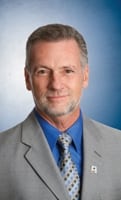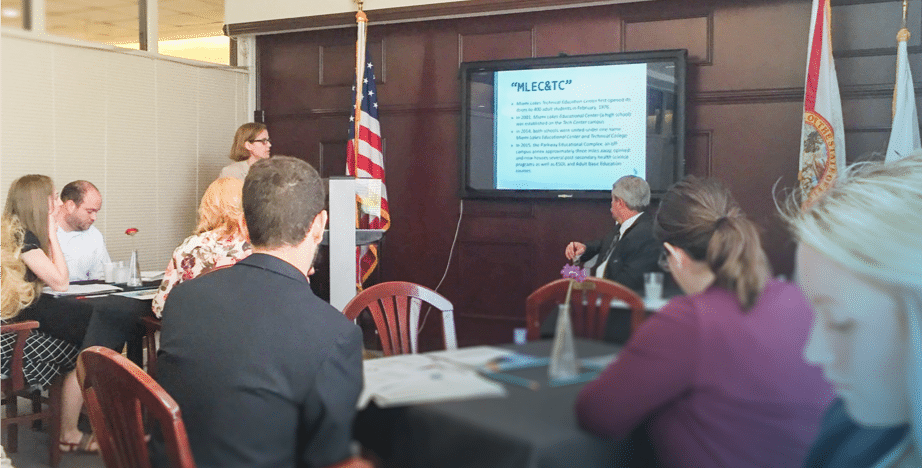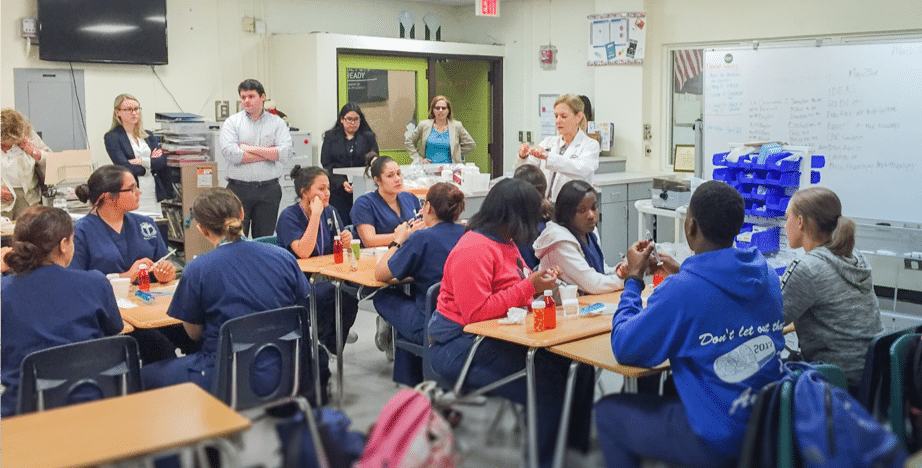Overview
While access to postsecondary education has expanded in recent decades, a large percentage of students entering community college are not adequately prepared for college-level work and must take developmental (remedial) courses in order to catch up. This forum highlighted a portfolio of new research on several promising strategies to help these underprepared students transition to college and ultimately advance to a degree. Broadly speaking, the experimental research suggests that short-term interventions can hasten students’ progress through developmental education and into college-level work, but the positive effects are often not large or long-term. These findings are to be released this summer in several reports by the National Center for Postsecondary Research (NCPR), a partnership between the Community College Research Center, MDRC, the University of Virginia, and faculty at Harvard University.
Following an overview of the research, community college leaders on our panel described how they are applying the research to design more comprehensive programs and structured pathways which better support the students at their colleges. Presenters included Thomas Bailey, Director, National Center for Postsecondary Research; Evan Weissman, Operations Associate, MDRC; Regina S. Peruggi, President, Kingsborough Community College; and Richard Rhodes, President/CEO, Austin Community College.
Click here to view the event video!
PRESENTER BIOGRAPHIES
 Thomas Bailey is the George and Abby O’Neill Professor of Economics and Education at Teachers College, Columbia University. He is also director of the Community College Research Center (CCRC) and of two National Centers, the National Center for Postsecondary Research (NCPR), established in 2006, and the Center for Analysis of Postsecondary Education and Employment (CAPSEE), established in 2011. Both National Centers are funded by grants from the Institute for Education Sciences. Dr. Bailey established the Community College Research Center (CCRC) at Teachers College in 1996, with support from the Alfred P. Sloan Foundation and since 1992 has been Director of the Institute on Education and the Economy (IEE) at Teachers College.
Thomas Bailey is the George and Abby O’Neill Professor of Economics and Education at Teachers College, Columbia University. He is also director of the Community College Research Center (CCRC) and of two National Centers, the National Center for Postsecondary Research (NCPR), established in 2006, and the Center for Analysis of Postsecondary Education and Employment (CAPSEE), established in 2011. Both National Centers are funded by grants from the Institute for Education Sciences. Dr. Bailey established the Community College Research Center (CCRC) at Teachers College in 1996, with support from the Alfred P. Sloan Foundation and since 1992 has been Director of the Institute on Education and the Economy (IEE) at Teachers College.
In June 2010, U.S. Secretary of Education Arne Duncan appointed him chair of the Committee on Measures of Student Success, which developed recommendations for community colleges to comply with completion rate disclosure requirements under the Higher Education Opportunity Act. Dr. Bailey’s articles have appeared in a wide variety of education, policy-oriented and academic journals, and he authored or co-authored several books on the employment and training of immigrants and the extent and effects of on-the-job training. His most recent book, co-edited with Vanessa Morest, is Defending the Community College Equity Agenda (Johns Hopkins University Press, 2006). Dr. Bailey holds a Ph.D. in labor economics from MIT.
 Regina S. Peruggi is the president of Kingsborough Community College of the City University of New York. Located in Brooklyn, Kingsborough is a comprehensive community college with an annual enrollment of over 16,000 credit students and approximately 20,000 continuing education students. Prior to her Kingsborough appointment, Dr. Peruggi served as president of the Central Park Conservancy, a private, not-for-profit organization that manages Central Park. From 1990 to 2001, she was president of Marymount Manhattan College.
Regina S. Peruggi is the president of Kingsborough Community College of the City University of New York. Located in Brooklyn, Kingsborough is a comprehensive community college with an annual enrollment of over 16,000 credit students and approximately 20,000 continuing education students. Prior to her Kingsborough appointment, Dr. Peruggi served as president of the Central Park Conservancy, a private, not-for-profit organization that manages Central Park. From 1990 to 2001, she was president of Marymount Manhattan College.
A native New Yorker, Dr. Peruggi began her professional career as a drug abuse counselor. In 1974, she joined the City University of New York, where she developed and directed the York College Community Learning Center. In 1986, Dr. Peruggi was appointed as CUNY’s University Associate Dean for Adult and Continuing Education. She has taught at the elementary, college, and graduate levels.
Dr. Peruggi is an active member of many civic boards and academic associations. She is Chairperson Emerita of the Board and current Co-Chairperson of the Commissioners of the Women’s Refugee Commission. In addition, she is the Chairperson of the Havens Relief Fund Society. She also serves on the board of the Brooklyn Economic Development Corporation, Berkeley College, the Brooklyn Chamber of Commerce, Silvercrest Center for Nursing & Rehabilitation, and The Academy of Mt. St. Ursula and Healing Communities Network.
Dr. Peruggi earned her B.A. from the College of New Rochelle, her MBA from New York University, and her Ed.D. from Columbia University’s Teachers College.
 Dr. Richard Rhodes is the president and CEO of the Austin Community College District (ACC). He joined ACC in September 2011 after serving as president of El Paso Community College for 10 years.
Dr. Richard Rhodes is the president and CEO of the Austin Community College District (ACC). He joined ACC in September 2011 after serving as president of El Paso Community College for 10 years.
A native of Alamogordo, New Mexico, Dr. Rhodes received his Bachelor of Business Administration in Accounting and Master of Arts in Educational Management and Development from New Mexico State University. He earned his doctorate through the Community College Leadership Program (CCLP) at the University of Texas at Austin. CCLP honored Dr. Rhodes with its Distinguished Graduate Award in 2001.
Dr. Rhodes’ commitment to student success is unparalleled. He works to improve pathways into higher education, strengthen awareness of the community college mission, and give students the tools to accomplish their educational, professional, and personal goals.
Since arriving at ACC, Dr. Rhodes has enhanced the college’s partnerships, working closely with regional business and industry, other institutions of higher education, and school districts within ACC’s service area. He is closely involved with the Early College High School program, which gives students at two Austin high schools an opportunity to earn up to an associate degree by high school graduation. Dr. Rhodes is working to increase degree and certificate completion rates for all students, recognizing graduation as among the many benchmarks worthy of celebrating in students’ academic careers.
His professional associations include the American Association of Community Colleges’ 21st Century Commission on the Future of Community Colleges; the Formula Funding Advisory Committee for the Texas Higher Education Coordinating Board; the Governor’s Commission for a College-Ready Texas; and the Carnegie Foundation Board, among others.
Dr. Rhodes is active in the community, serving on the board of American YouthWorks as well as the economic development committees of the Greater Austin Chamber of Commerce and the Round Rock Chamber of Commerce. He also is a member of the board of ACC’s Center for Public Policy and Political Studies.
 Evan Weissman has nearly fifteen years of experience in education and social policy research at MDRC. Weissman has directed projects, provided technical assistance, and conducted qualitative research in a wide range of settings. His current work is primarily focused in the area of postsecondary education, helping to better understand ways to improve college access, persistence, and success for low-income and underprepared students. Weissman plays key roles on the national Learning Communities Demonstration and the Texas Developmental Summer Bridge Study, both of which are being conducted as part of the National Center for Postsecondary Research. He has also played key roles in providing technical assistance, designing and launching random assignment evaluations, and conducting qualitative research in a range of social policy areas including financial aid; early childhood education; job training and parenting programs for non-custodial parents; public housing; and welfare employment programs. Weissman’s publications include, among others, “Learning Communities for Students in Developmental English” (2012), “Learning Communities for Students in Developmental Math” (2011), and “Promoting Partnerships for Student Success: Findings from the SSPIRE Initiative” (2009).
Evan Weissman has nearly fifteen years of experience in education and social policy research at MDRC. Weissman has directed projects, provided technical assistance, and conducted qualitative research in a wide range of settings. His current work is primarily focused in the area of postsecondary education, helping to better understand ways to improve college access, persistence, and success for low-income and underprepared students. Weissman plays key roles on the national Learning Communities Demonstration and the Texas Developmental Summer Bridge Study, both of which are being conducted as part of the National Center for Postsecondary Research. He has also played key roles in providing technical assistance, designing and launching random assignment evaluations, and conducting qualitative research in a range of social policy areas including financial aid; early childhood education; job training and parenting programs for non-custodial parents; public housing; and welfare employment programs. Weissman’s publications include, among others, “Learning Communities for Students in Developmental English” (2012), “Learning Communities for Students in Developmental Math” (2011), and “Promoting Partnerships for Student Success: Findings from the SSPIRE Initiative” (2009).
Experts from the National Center for Postsecondary Research and MDRC discussed the following research:
Learning Communities Demonstration
Learning Communities are a strategy often used by community colleges to improve completion rates for students in developmental education. This intervention places small cohorts of students together in two or more courses, often for one semester during the freshman year. NCPR is analyzing the effects of learning communities at six community colleges across the nation. Key findings to be released this summer suggest that when compared to business as usual, single-semester developmental education learning communities, on average, lead to: a modest impact on credits earned in the targeted subject area (math or English); no impact on credits earned in courses outside of the targeted subject; and no discernible impact on persistence. The research suggests, though, that while most typical learning communities for students in developmental education are not likely to lead to large changes, when paired with more intensive supports and encouragement to stay enrolled, the intervention may make a meaningful difference.
Texas Developmental Summer Bridge Study
Summer Bridge Programs are a popular strategy for increasing college readiness, particularly among recent high school graduates. NCPR is studying the effects of summer bridge programs at eight colleges in Texas to assess whether these programs reduce the need for developmental coursework and improve student outcomes in college. The programs studied offered students four to five weeks of accelerated instruction in developmental math, reading and/or writing; academic support; a college knowledge component; and a stipend of up to $400. Key findings to be released this summer show that when compared to business as usual, these short, intensive, developmental education summer bridge programs lead to higher rates of passing college-level math and writing courses in the first few semesters after the summer program. After two years, however, students who were not offered summer bridges had largely caught up in passing these courses, and there were no discernible differences in cumulative academic progress. Summer bridge programs also had no impact on students’ rates of college enrollment or persistence.
College Readiness Partnerships
As states grapple with ways to improve the college readiness of graduating high school students, NCPR researchers undertook a study in Texas to explore programs in which secondary and postsecondary institutions are working together on college readiness. Researchers conducted a literature review, an online scan of college readiness partnership programs, and four site visits to high schools, colleges, and community-based organizations in the Houston and Dallas–Fort Worth areas, identifying the features, targeted students, and intended outcomes of the programs. For the most part, the programs could be classified into two types: those that focused on academic subjects, and those that focused on college knowledge. The former tended to be intensive, short-term programs that targeted a small group of students and provided a direct experience of college; the latter tended to be light-touch, longer-term programs that were open to all students and provided little direct experience of college. Few rigorous evaluations of these types of programs have been conducted, but they do have the potential to improve college readiness through opportunities for secondary and postsecondary institutions to leverage each other’s services and collaborate in a meaningful way.
Click here to view Richard Rhodes’ Powerpoint presentation
Click here to view Evan Weissman’s Powerpoint presentation
Click here to view Thomas Bailey’s Powerpoint presentation
Click here to view Regina Peruggi’s Powerpoint presentation
Presenter Information
Thomas Bailey
Director
National Center for Postsecondary Research
Box 174, 525 West 120th Street
New York, NY 10027
Evan Weissman
Operations Associate
475 14th Street
Suite 750
Oakland, CA 94612-1900
Regina S. Peruggi
President
Kingsborough Community College
2001 Oriental Boulevard
Brooklyn, NY 11235
Richard Rhodes
President/CEO
5930 Fiskville Road
Austin, TX 78752




